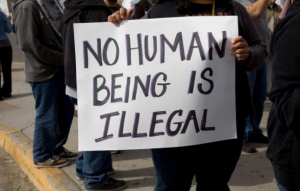
Certain states, unwilling to accommodate certain numbers of refugees from the Middle East and North Africa, are seeking ways to cut the quotas that have been given to them by making an attempt to persuade Brussels that they have already been actively engaged in helping those poor souls in desperate need of assistance. Particularly, Poland has refused to accept tens of thousands of refugees arriving in Europe, by arguing that the country has already accommodated hundreds of thousands of Ukrainians and has no capacity to accommodate any more. In particular, Polish politicians state that in the period from January to June 2015 their country has already accommodated 403 thousand Ukrainian citizens by issuing to them temporary work permits and visas. However, according to the German newspaper Sueddeutsche Zeitung, Poland is simply replacing hundreds of thousands of Polish workers that have already immigrated to Germany or England, while claiming refugees arriving from the Middle East won’t be welcome.
Yet, making money on refugees is one thing, it is quite other to make a business built on people who aren’t even supposed to exist. The very people that are being pushed out of countries that they’ve been residing in for the best part of their lives.
Thus, the leader of the Lega Nord Party, Matteo Salvini, has recently revealed the details on how Baltic countries are deliberately deceiving the EU in an attempt to reduce migrant quotas by inventing non-existent migrants, while manipulating the permanent residence of their countries, namely those ethnic Russians that migrated to those states in the period from 1940 to 1989. Those ethnic Russians are still enjoying the status of “non-citizen”, while being presented by the Baltic states as “immigrants” to EU officials. In particular, Latvia alone has already received more than 33 million euros from various funds to “accommodate” 250 thousand Russian non-citizens, while Estonia has been presented with a bit less impressive sum to “accommodate” 88 thousand non-citizens. Those “non-citizens” have not received a dime, since the funds have been pocketed by Baltic politicians.
In the light of these multi-million dollar “revenues” that Baltic states are getting for treating ethnic Russians as “semi-humans”, the statements about those only being able to spend tens of thousands of euros on refugees from the Middle East and North Africa sound somewhat remarkable. It is also noteworthy that the Baltic states continue profiting from their vicious schemes. According to ValtNews, on June 11 Estonian Prime Minister Taavi Rõivas confirmed that Estonia will get an additional 10 million euros over a seven-year period for it to be able to “accommodate refugees”. There’s little doubt that Latvia will get even more money.
These fraudulent actions of the Baltic political elites would have remained secret, if German economists didn’t notice the fact that the claimed number of “accepted refugees” in Estonia and Latvia was the same for the number of “non-citizens” residing in these republics. So it’s safe to assume for a quarter of a century the Baltic states have been illegally receiving “financial assistance” to accommodate non-existent “refugees” from a total of four international funds.
These facts should become the subject of court proceedings, but the Baltic states are not the only ones at fault. Why did the political elites of the European Union turn a blind eye to the fact that for all these years hundreds of thousands of law-abiding Russian “non-citizens” in the Baltic countries were subjected to intentional discrimination, deprived of normal passports and 80% of the rights that regular citizens of these states would enjoy. It is noteworthy that in the same time, no other ethnic group was subjected to such discrimination in the EU, for instance, after residing for a small period of time in the EU, Turks are getting “normal” passports and citizenship. One would hate to think that such positions taken up by EU officials are dictated by a racial or cultural bias…
One would assume that once these facts have been made public, the Baltic states will set the record straight, along with accommodating hundreds of thousands of refugees from the Middle East and North Africa who have every right to enjoy the money that was allocated to the “accommodation” of Russian “non-citizens”.
Taking into account the interest of the ruling Baltic elites in the financial assistance for migrants, it can safely assume that these states would love to participate in the EU programs aimed at stimulating additional resettlement of immigrants, especially in light of these being able to negate demographic problems. And the problems that the Baltic states are facing in this area are well known, particularly in Latvia, where the populations has been reducing at a rate of 300 thousand people over a decade. The terrible outflow of their indigenous population from Estonia has also been reported numerous times.
Vladimir Odintsov, political commentator, exclusively for the online magazine “New Eastern Outlook”.
